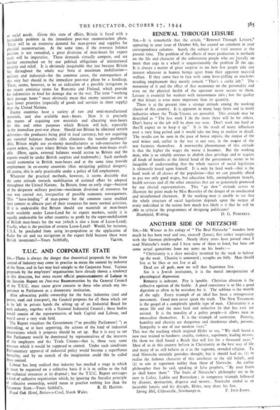RENEWAL THROUGH LEISURE
siR,—It is remarkable that the article, "Renewal Through Leisure," appearing in your issue of October 8th, has caused no comment in your
correspondence columns. Surely the subject is of vital interest at the present time. The problem of the effects of mass production in methods on the life and character of the unfortunate people who are literally no more than cogs in a wheel is unquestionably the problem Of the age. It is always a matter of great surprise to me how few people take any interest whatever in human beings apart from their apparent material welfare. If they come face to face with some lever-pulling or machine- minding employment they merely remark "That's a cushy job." The e monotony of it and the effect of that monotony on the personality and even on the physical health of the operator never occurs to them. Leisure is essential for workers with monotonous jobs ; but the quality of that leisure is even more important than its quantity.
There is at the present time a strange attitude among the working classes of this country. It is apparent in many large firms and in many industries where the Trade Unions are powerful. This attitude may be described as "The less work I do the more there will be for others. Don't hurry or the job will be done too soon. Don't work too hard or they'll expect us to keep it up." It is the result of many influences over a very long peiiod and it would take too long to analyse in detail. The results can be seen in the pace of house repairs, the output of the coal mines and, earlier in the war at any rate, in the ousput of the war factories themselves. A noteworthy phenomenon of this attitude is that the higher the wages the worse it becomes. But the working man, who is so volubly anxious to abolish class privilege and to acquire all kinds of benefits at the liberal hand of the government, seems to be incapable of understanding that the whole success of social legislation • is ultimately based upon himself. It is only by hard work—that is the hard work of all classes of the population—that we can possibly afford to pay not only good wages, but education bills, unemployment benefit, health services and all the other amenities that are so generously promised. by our elected representatives. This "go slow" attitude serves to illustrate the point made by Miss Reaveley of the danger of an uneducated and misinformed electorate. If the working man is unable to see that the whole structure of social legislation depends upon the output of every individual in the nation how much less likely is it that he will be able to criticise the programmes of designing politicians?


























 Previous page
Previous page